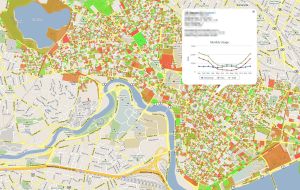Category Archives: smart cities
The Power of Information: Unleashing Energy Consumption Data
 Encouraging energy efficiency among residents and businesses is hard work, not least because of the absence of accessible and easily understandable information about energy consumption. Most people don’t understand everything on their energy bills, don’t know if they’re using more energy than they should, and have no way to compare their energy use to that of their neighbors. This information is often guarded closely by utilities, presenting energy efficiency advocates with a formidable barrier.
Encouraging energy efficiency among residents and businesses is hard work, not least because of the absence of accessible and easily understandable information about energy consumption. Most people don’t understand everything on their energy bills, don’t know if they’re using more energy than they should, and have no way to compare their energy use to that of their neighbors. This information is often guarded closely by utilities, presenting energy efficiency advocates with a formidable barrier.
In her thesis, Alexis Howland (MCP ’13) sketches the possibilities afforded by better energy consumption data. She surveyed efforts across the country to share energy efficiency data. Alexis focuses on incorporating these data into mapping applications—which could lay bare the differences in energy consumption among homes and add valuable information to the housing market. These efforts could be combined to allow no-touch energy assessments that offer actionable suggestions for homeowners who want to improve their energy efficiency.
In a survey of five previous attempts at energy mapping, Alexis notes a common theme: the developer’s inability to access or make public energy consumption data at the household level. This, Alexis explains, is due to privacy concerns that have so far prevented such data from being used to its full potential.
Alexis explores ways of unleashing these data. Several cities—including Boston—have recently passed ordinances that require the disclosure of energy consumption data, and the federal government has offered a framework for voluntary energy data disclosure through the Green Button Initiative. While these efforts must overcome serious privacy concerns, they have the potential to make public vital information about the way people and buildings nationwide use energy. Read more about Alexis’ survey of the opportunities for and barriers to energy mapping projects in her thesis.
So what is a “smart city”, anyway?
 The planning and tech worlds alike have taken up the mandate to build “smarter” cities. However, there seems to be a wide array of definitions regarding what makes a city smart. When we talk about smarter cities, what are we talking about?
The planning and tech worlds alike have taken up the mandate to build “smarter” cities. However, there seems to be a wide array of definitions regarding what makes a city smart. When we talk about smarter cities, what are we talking about?In his thesis, Tuan-Yee Ching (MCP ’13) provides a framework to consider the different ways that cities view themselves—and their initiatives—as “smart.” In a six-city study that includes interviews with officials in Boston, San Francisco, Amsterdam, Stockholm, Singapore, and Rio de Janeiro, Tuan-Yee discovered four different ways that cities consider themselves to be smart.
A city may call itself smart because it adopts new technologies and adapts itself to their use, as with Rio’s deployment of a suite of advanced weather sensors to better track and respond to local weather impacts. A city may also be smart for adopting new collaborative processes to work with stakeholder communities in innovative new areas, like San Francisco’s “Unhackathon” that crowd-sourced ideas to optimize taxi service with technological improvements. Cities may be smart because of a commitment to learning and adaption informed by lessons from other cities and the use of performance metrics, as in Boston’s participation in the G7 network of American cities that offers a forum for idea-sharing between municipal Chief Information Officers. Or cities may call themselves smart because they make investments in the technology sector that promise future returns, as with Singapore’s “Living Lab” fund, which offers public sector support for ventures in clean energy, urban mobility, IT, and public safety.
Tuan discusses the implications for these four very different notions of what a smart city really is, and he provides a series of recommendations for policymakers to keep in mind as they try to make their cities smarter—whatever that means to them. Read more in his thesis.